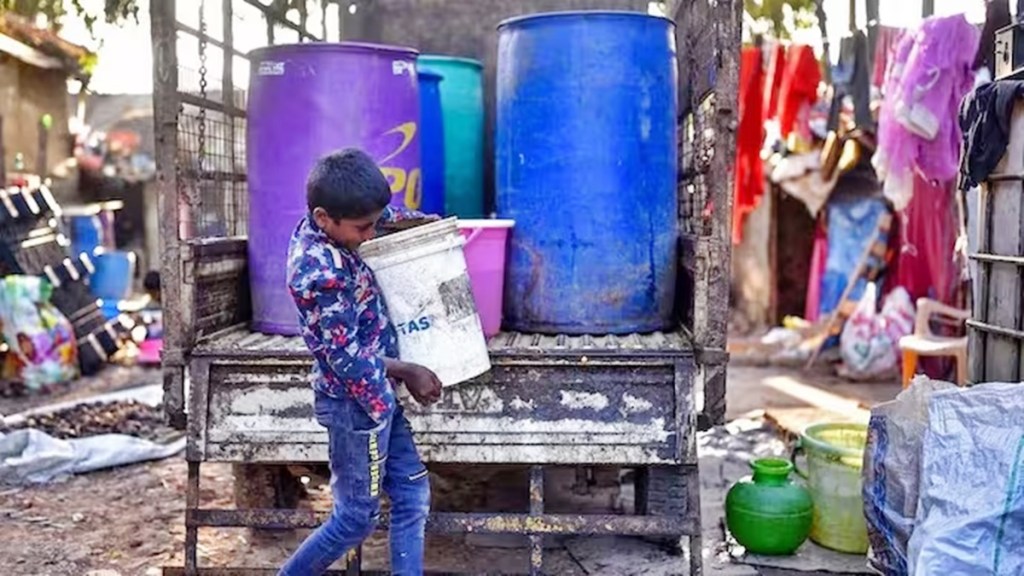Amid the water crisis in Bengaluru, the Karnataka government has decided to take charge of water tankers supplying water sourced from borewells to households. Deputy Chief Minister DK Shivakumar has now warned water tanker owners in the state about the potential seizure of their tankers if they do not register with the authorities before the March 7 deadline.
This action is prompted by the growing concerns surrounding water scarcity in the state and the subsequent surge in tanker rates. Addressing the media at the Bruhat Bengaluru Mahanagara Palike (BBMP) head office on Monday, Shivakumar revealed that out of the 3,500 water tankers operating in Bengaluru, only 10 per cent (219 tankers) have registered with the authorities, highlighting that those remaining will face seizure if they do not comply by the specified date.
Also Read:MHA hands over Bengaluru blast probe to NIA, agency files FIR
“Water is not the property of any individual but is a resource that belongs to the government. The government has the right to take control of water sources. The Bangalore Water Supply and Sewerage Board (BWSSB) officials have been instructed to be prepared to supply water from areas where groundwater is abundant. The BWSSB is using 210 tankers to supply water already. Election code of conduct will not come in the way of supplying water,” Shivakumar said, ANI reported.
Private water tanker services in Bengaluru are currently charging varying rates, ranging from Rs 500 to Rs 2000 per tanker. To address this issue, authorities are planning to engage with the Association to establish a standardised pricing system. The government has allocated Rs 556 crore to tackle the water crisis in Bengaluru.
Shivakumar had previously announced the state government’s decision to take control of all tankers responsible for distributing water sourced from borewells in the city. He stressed the importance of this move in ensuring fair water distribution and preventing any illicit water trafficking during these critical times.
‘Bengaluru water crisis’
Bengaluru is grappling with one of the most severe water crises in its history. The city currently has access to approximately 1,850 million litres per day but requires at least an additional 1,680 MLD to meet its water needs. A substantial water shortage is affecting Bengaluru, leading officials from the BWSSB (Bangalore Water Supply and Sewerage Board) and BBMP (Bruhat Bengaluru Mahanagara Palike) to conduct daily meetings to address the issue.
The BBMP recently mandated that all water tanker operators must register on the municipal corporation’s portal within a week, accompanied by a requirement to carry valid certification in their vehicles at all times.
Also Read:Caught on cam: CCTV footage shows Bengaluru’s Rameshwaram Cafe blast suspect with handbag
Deputy Chief Minister Shivakumar has announced the allocation of Rs 10 crore from department grants to each assembly constituency in Bengaluru, with a special meeting which was scheduled for Monday (March 4) afternoon to further discuss this allocation. Despite these assurances, water tanker operators continue to exploit the situation, escalating prices to exorbitant levels.
The cost of a 12,000-litre tanker, which was Rs 700-800 in early January, has now surged to Rs 1,500-1,800, surpassing Rs 2,000 in areas experiencing severe water shortages.
A senior official from the Bruhat Bengaluru Mahanagara Palike (BBMP) disclosed that out of the 4,000 water tankers operating in the city, only 60 have obtained licenses from the municipal corporation. Initiatives are underway to crack down on unauthorized tankers.
Also Read:Karnataka government bans sale, use of ‘hookah’ statewide, cites ‘safety’ concerns
In response to the water scarcity situation, BBMP helplines and ward-specific grievance centres will be established, and a dedicated war room has been set up for real-time monitoring. Senior officials, along with Shivakumar, will personally oversee the daily situation, assuring citizens that providing drinking water is a government responsibility. Measures are in place to address the crisis.
Out of the 16,781 borewells recorded, 6,997 have dried up, while 7,784 remain operational. The government plans to drill new borewells, and efforts are underway to reconcile pricing disparities between local and Tamil Nadu vendors. Unused milk tankers from the KMF will be repurposed for water supply after thorough cleaning, and deployed until the water shortage is resolved.
Officials are instructed to activate all non-operational drinking water centres immediately. Bescom officials are tasked with registering all borewells used for agriculture and commercial purposes.
Acknowledging the severity of the water crisis, Shivakumar urged the public to use water judiciously, avoiding unnecessary consumption for activities like gardening and car washing. Treated water is recommended for non-essential purposes. Regarding water tanker prices, a meeting with private water tanker owners is scheduled for March 7 to establish a standardized pricing system.

